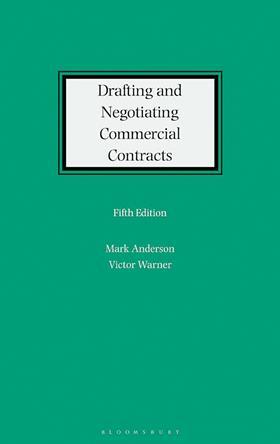Contract treasure trove
Drafting and Negotiating Commercial Contracts (fifth edition)
Mark Anderson and Victor Warner
£165, Bloomsbury
★★★★★
This book is an absolute gem for legal professionals navigating the intricate world of commercial contract law. It is an invaluable resource that exceeded my expectations in terms of its comprehensive coverage of the latest trends and practical insights.
The authors’ expertise shines through as they cover various aspects of commercial contracts, including drafting, exchanging, and protecting documents electronically. For today’s digital age, the authors offer practical guidance on leveraging electronic tools and technologies to streamline the drafting and negotiation process, while ensuring that sensitive documents are protected.

The book addresses the benefits and challenges of electronic document exchange. It further explores the use of email, electronic signatures, and document-sharing platforms, outlining best practices for efficient and secure communication. There are also valuable insights into the legal considerations and requirements for electronic contracts, equipping readers with the knowledge necessary to navigate this increasingly prevalent method of contract formation.
What sets this book apart is the level of detail and specificity. The authors leave no stone unturned as they explore various types of commercial contract, including supply agreements, licensing agreements and service contracts. Each type receives dedicated chapters that offer tailored guidance and best practice, taking into account the unique nuances associated with them. The inclusion of case studies and examples further elevates the book’s practicality. Anderson presents real-world scenarios and analyses contractual provisions, allowing readers to see how the principles discussed can be applied in practice.
While this book is undoubtedly a treasure trove for legal professionals, it does assume a basic understanding of contract law. The authors do provide a brief introduction to the fundamental principles, but readers without prior knowledge might find some sections challenging to grasp fully.
Nonetheless, for those with a foundational understanding of contract law, this book serves as an excellent tool for honing drafting and negotiation skills, as well as staying informed about the latest legal trends. This is a remarkable and highly practical resource that has earned its place on my bookshelf.
Sheyla Rzaeva is a solicitor at Hogan Lovells International LLP, London
Drafting and Negotiating Commercial Contracts
Clarity in drafting commercial contracts – whether they be with consumers or in a business-to-business context – is an ever more challenging issue. For a firm such as my own which advises other law firms, whenever we draft we know our clients are expecting excellence, not least because we are the advisers to the advisers. I had not come across Drafting and Negotiating Commercial Contracts in its previous four editions, but it has been a very welcome addition to the library.
The book starts with the very basics and would be useful to those new to commercial contracts, such as paralegals and trainees. But as the book progresses, it addresses some of the more challenging issues, such as drafting consumer contracts and the use of legal terms and jargon. Helpfully it offers simple explanations to issues that can confuse. The explanation of time periods, for example in the legal terms and lawyers’ jargon section, contains three and a half pages of material which I have not previously seen set out so clearly and succinctly. This is incredibly helpful when an issue arises when drafting, which is when I have tended to pick this book in preference to the online contract guides or precedent clause bank of our expensively assembled online services. While I used the hardback, I noted it was listed as being available on the publisher’s online service.
The chapter on termination of contract is particularly strong. The emphasis is on the practical and providing solutions, rather than being a theoretical or scholiastic work. Similarly, the chapter on checking commercial contracts before signing them is a useful and practical checklist.
My minor quibble? More precedent agreements should be included next time because the clarity of the drafting displayed in the content cries out for more examples of common commercial contracts.
This is a book that every lawyer involved in drafting, negotiating and, I would add, ending commercial contracts should have at their fingertips. It is concise, user-friendly and well worth the money. It will benefit a paralegal new to the area, or an experienced partner wanting a succinct way of addressing a knotty issue.
Paul Bennett is a partner at Bennett Briegal LLP, a law firm that advises law firms and professional practices































No comments yet